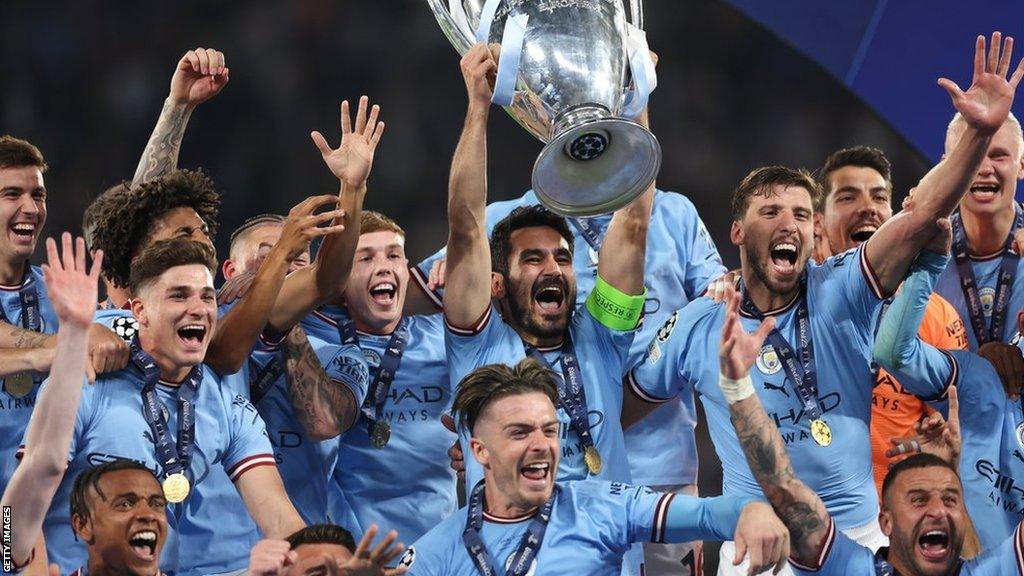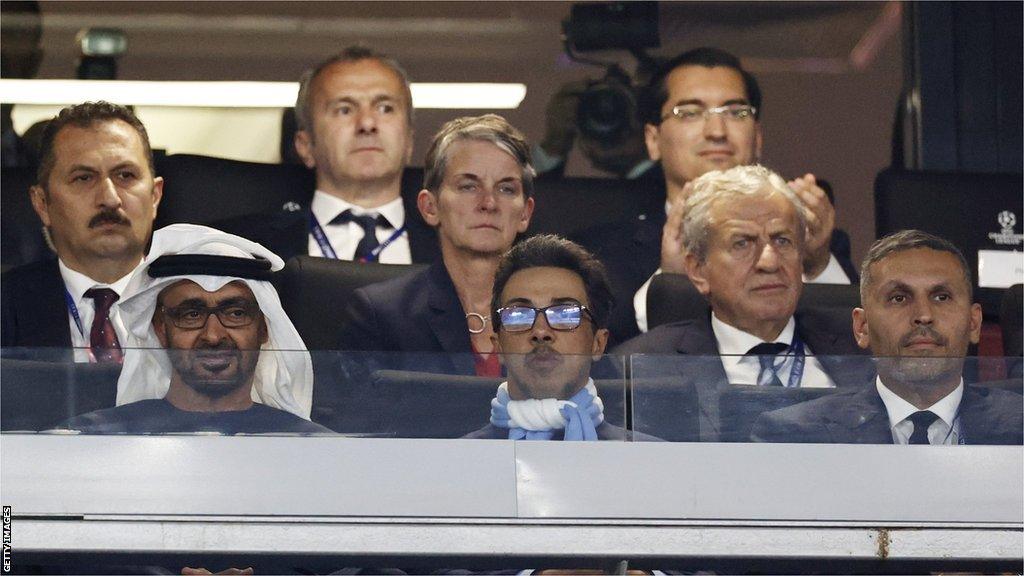Manchester City: Why Treble-winners' domination provokes questions as well as praise
- Published
- comments

Manchester City added the Champions League to their earlier Premier League and FA Cup wins to secure the Treble
Manchester City's Champions League triumph in Istanbul felt like one of the most momentous results in football for years.
It ended City's long pursuit of the trophy they coveted most.
And by sealing only the second Treble an English club has managed, it ensured the team and their manager will always enjoy legendary status.
Add in the fact that when arch-rivals Manchester United managed the only previous Treble in the 1998-99 season City were down in the third tier, and the significance of what is a remarkable sporting journey becomes clear.
City had overtaken United on and off the pitch long before Istanbul, of course. But victory reinforced the sense of a seismic shift in the sport's balance of power - in Manchester, domestically, and now across the European game, where many believe Pep Guardiola's team could dominate as they have in England.
They conquered Europe at a time when the sovereign wealth funds of Qatar and Saudi Arabia own PSG and Newcastle United respectively. When a member of the Qatari ruling family is bidding to buy Manchester United. It came just days after it was announced Saudi finance was about to shake up the way golf is run globally. For many, Istanbul was another major milestone in the broader theme of Middle Eastern investment into sports.
There is much to admire about the way City play, Guardiola's coaching, and their wider system and global structure - one that now includes a state-of-the-art academy, and 13 clubs under the umbrella of the City Football Group (CFG).
City's under 18s recently became the first ever, external to win three successive national championships. City's under 21s have also just become the first to secure a hat-trick of consecutive Premier League 2 titles., external
And, since 2016, City's relaunched women's side have also won the FA Cup on three occasions and the Women's Super League once.
And yet, as well as renewed admiration, City's triumph also means additional scrutiny.
The extremely rare sight in Istanbul of majority owner Sheikh Mansour - whose sovereign wealth has transformed the fortunes of the club - at just his second City match since taking them over via his Abu Dhabi Investment Group in 2008 - was a vivid reminder of some of the questions and issues that swirl around the new champions of Europe.
The fact Mansour - the deputy prime minister of the United Arab Emirates (UAE) - was at his first City match for 13 years inevitably led to more questions over the motivation for his ownership.
Human rights campaigners believe the club is being used to 'sportswash' what Amnesty has called the "deeply tarnished image" of the oil-rich UAE.
Last month, more than 40 NGOs, external accused the UAE of a "sustained assault on human rights and freedoms, including targeting human rights activists, enacting repressive laws, and using the criminal justice system as a tool to eliminate the human rights movement".
The UAE has also had one of the world's highest per-capita carbon-emission rates.
But evidence can be provided of a strong investment that has added value, not simply a soft power vehicle in an attempt to diversify its economy and boost tourism.
City can point to the fact that while about £1.5bn has been spent on new players since 2008, Mansour bought City via a private equity group for £200m, and they are now estimated to be worth £4bn,, external with a £42m profit announced last year., external
Ros Atkins on… Manchester City’s finances
There is also renewed focus on the UAE's foreign policy, with scrutiny of Abu Dhabi's relationship with the regime of Russian President Vladimir Putin.
In March, the US government said it was "concerned" UAE companies had exported millions of pounds worth of goods to Russia, helping the country to get round international sanctions.
Last year, the UAE abstained from a US-led vote at the UN condemning Russia's invasion of Ukraine. And in October, Putin hailed Russia's ties with the UAE during a meeting with the country's president, Sheikh Mohamed bin Zayed Al Nahyan.
'MBZ' - as he is known - is also the ruler of Abu Dhabi, and sat next to his brother - Sheikh Mansour - at the Champions League final.
The UAE has been a key Western ally in the Gulf region, with the country conducting billions of pounds worth of trade with Britain. But last year the UK government was critical of Mansour after a meeting between him, other UAE leaders, and Syrian president Bashar-Al-Assad.
A spokesperson for the Foreign Office said at the time such meetings "undermine the prospect" of peace in Syria. City did not respond to requests for comment. Syria, and the Assad regime, remain under US and European sanctions.

Sheikh Mohammed bin Zayed Al Nahyan (front left) was alongside Sheikh Mansour and City chairman Khaldoon Al Mubarak in Instabul
It is not just international politics that make the club's Abu Dhabi ownership controversial.
As well as the Treble, City's season was notable for the catalogue of more than 100 alleged financial rule breaches between 2009 and 2018 that the Premier League charged the club with.
City were also accused of failing to co-operate with an investigation. According to experts, the league appeared to be claiming sponsorship income linked to City's owners was artificially inflated.
City deny wrongdoing, saying their innocence is supported by a "body of irrefutable evidence".
In 2020, they successfully overturned a two-year Uefa ban from European competitions for financial fair play breaches, with the Court of Arbitration for Sport clearing the club of "disguising equity funds as sponsorship contributions".
The alleged breaches were either not established or time-barred, although City were fined for failing to co-operate with Uefa's process.
But until the Premier League case is concluded - and that could take years - suspicion over exactly how City have achieved their success, along with talk from rival fans of asterisks next to titles, and possible points deductions if found guilty, will inevitably continue.
Such intrigue only adds to those concerned that City's dominance and wealth could be affecting the competitive balance of the sport. That the Premier League is starting to become too predictable, with City champions five out of the past six seasons.
Next season, City will be favourites to win a fourth consecutive league title - something no team in the history of English football has achieved.
On the European stage, too, there have been concerns the multiple-club model allows City to stockpile talent, and many of the continent's traditional powers will be worried the club could emulate Real Madrid, who have won the Champions League five times in the past decade.
Little of that will bother many of the City fans who experienced the joy of Istanbul, of course, and of those who were at the Etihad to watch their team dismantle the likes of Arsenal and Real Madrid in recent weeks.
Or many of those who braved the rain to witness this week's victory parade. Especially those old enough to remember the years when they existed firmly in the shadow of their then dominant neighbours United.
Many (but not all) such fans believe envy lies behind much of the criticism City receive, and make the point other clubs have enjoyed similar eras of dominance in the past, and that other Premier League rivals have spent similarly vast amounts without managing the success that City have enjoyed.
They believe City should just be celebrated.
But there is still too much to be resolved, and too much intrigue surrounding those who own the club, for it ever to be as simple as that.

How did the 'Rocket' become the greatest snooker player? Ronnie O'Sullivan looks back at his life and career
How did an American spy escape from prison? Helena Bonham Carter shines a light on Virginia Hall's astonishing deed during World War Two

